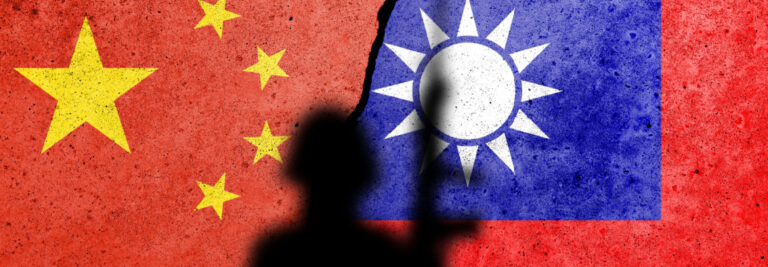In her new year’s address, Republic of China (ROC) President Tsai Ing-wen (蔡英文) focused on a “Resilient Taiwan” (堅韌台灣) and “stable governance,” but she did not discuss presidential succession—despite the fact that Taiwan faces China’s “decapitation” among other threats. If Taiwan is to be resilient, then leaders across parties need to establish a clear, credible, and comprehensive plan for presidential succession. A behind-the-scenes succession list apparently exists. A “porcupine” is useless if its head is cut off, which is one of the reasons that this author objects to this over-used analogy for Taiwan’s defense. How can Taiwan proactively ensure continuity of its leadership, government, and military command and operations?
“Decapitation” to Abolish the ROC
Taiwan has a relatively short history of democratic presidential succession and transfer of power. In 2000, this author was involved in meetings in Washington for Hsiao Bi-khim (蕭美琴) (then an official of the Democratic Progressive Party (DPP, 民主進步黨) and now Taiwan’s Representative to the United States) to learn how to conduct Taiwan’s first-ever presidential transition from one party to another when the Kuomintang (KMT, 中國國民黨) lost ruling power for the first time in an election.
Nonetheless, under China’s threats, it would be irresponsible for the leaders of Taiwan’s major political parties to fail to establish sustained presidential succession in order to prevent chaos, political paralysis, or powerless government. Taiwan already has experienced incidents and knows of China’s threat of “decapitation.” The President is the head of the ROC as well as Commander-in-Chief of the military with authority over the Minister of National Defense, who directs orders to the Chief of General Staff (CGS) to command the armed forces. Taiwanese military culture is centralized, highly risk-adverse with no war experience, and based extensively on personalities. The President leads the people’s will to fight. The President speaks for Taiwan vis-à-vis China and globally. The President symbolizes Taiwanese democracy to be defended.
Current comments about Taiwan’s defense emphasize not only asymmetric warfare but also resiliency and whole-of-society efforts. Three reasons already compel Taiwan to settle succession with urgency, which is in its unilateral power to resolve without foreign cooperation.
“Hostage Diplomacy”
First, China has an egregious record of taking hostages as part of its malign targeting against other governments. In April 2001, after a collision over the South China Sea between a US Navy EP-3 reconnaissance plane and a People’s Liberation Army (PLA) Navy F-8 fighter, China held for 11 days the 24 US naval personnel who survived an emergency landing on Hainan Island. In a more recent example, Canada suffered China’s “hostage diplomacy.” Taiwan’s military trained to secure its national command during the Han Kuang exercise (漢光演習) in July 2020. Special forces drilled in a rescue of leaders held hostage by invaders.
Serious Incidents
Second, Taiwan has experienced what seem like movie plots but were serious incidents in presidential security. On March 19, 2004, on the very eve of an election, an assailant shot and injured both President Chen Shui-bian (陳水扁) and Vice President Annette Lu (呂秀蓮), while they campaigned in a jeep in Tainan. In another example, on August 18, 2017, on the day that this author visited the Presidential Office Building with President Tsai inside, an assailant slashed a military guard with a samurai sword at an entrance, but other military police did not shoot him.
Reuters reported in December 2021 that China’s espionage operations penetrated the security unit that protected President Tsai. A retired presidential security officer and a serving military police lieutenant colonel in the unit had their convictions upheld last year for leaking sensitive information about Tsai’s security to one of China’s intelligence agencies.
Military Warnings
Third, Taiwan knows about warnings concerning threats against its leadership. Last November, Taiwan’s Ministry of National Defense (MND) issued its latest National Defense Report of 2021. MND warned that all of the PLA’s ballistic, cruise, and air-launched land-attack missiles plus the weapons of the PLA Navy and PLA Air Force could attack euphemistically-called “high-value targets” in Taiwan’s government, economy, and military as well as “decimate” its operations.
The US Department of Defense’s latest report to Congress on China’s military power warned in November 2021 that the PLA prepares to threaten Taiwan’s leadership in various ways. The PLA will attempt to isolate Taiwan’s authorities and people, and to control the narrative of the conflict. Another effort will undercut the perceived effectiveness or legitimacy of Taiwan’s government.
The Pentagon also warned that:
- “Such a campaign could include computer network or limited kinetic attacks against Taiwan’s political, military, and economic infrastructure to induce fear in Taiwan and degrade the Taiwan population’s confidence in their leaders.”
- “Similarly, PLA special operations forces (SOF) could infiltrate Taiwan and conduct attacks against infrastructure or leadership targets.”
- “The PRC could use missile attacks and precision air strikes against air defense systems, including air bases, radar sites, missiles, space assets, and communications facilities to degrade Taiwan’s defenses, neutralize Taiwan’s leadership, or break the Taiwan people’s resolve.”
Recommendations for Resiliency
(1) As the first of five recommendations, Taiwan needs to consider and establish a clear, credible, careful, and constitutionally-based plan for legal presidential succession that is communicated to the Taiwanese people in peacetime, before critical contingencies occur in a crisis or conflict.
The ROC Constitution has limited stipulations for only a few successors to the president, but this author believes that Taiwan has a protocol list with the following longer line of succession.
1. President, Tsai Ing-wen (蔡英文)
2. Vice President, Lai Ching-te (賴清德)
3. President of the Executive Yuan, Premier Su Tseng-chang (蘇貞昌)
4. President of the Legislative Yuan, Speaker You Si-kun (游錫堃)
5. President of the Judicial Yuan, Hsu Tzong-li (許宗力)
6. President of the Examination Yuan, Huang Jong-tsun (黃榮村)
7. President of the Control Yuan, Chen Chu (陳菊)
8. Secretary-General of the Office of the President (OP), David Lee (李大維)
9. Secretary-General of the National Security Council (NSC), Wellington Koo (顧立雄)
10. Minister of Foreign Affairs, Joseph Wu (吳釗燮)
11. Minister of National Defense, Chiu Kuo-cheng (邱國正)
12. Minister of the Mainland Affairs Council (MAC), Chiu Tai-san (邱太三)
Such an assumed succession list raises some questions.
- Is this list correct about the plan of succession? What are its legal bases?
- Is this succession optimal or appropriate, especially in a conflict? For example, would the Minister of Defense be more qualified than the President of the Examination Yuan?
- If Premier Su is killed, is incapacitated, is missing, or resigns while exercising presidential power, would Vice Premier Shen Jong-chin (沈榮津) then assume the power as the new premier or would it then transfer to the next official on the list (Speaker You)?
- How useful are the ROC’s Constitution and laws in determining presidential succession? For example, what if the presidential position is not “vacant,” but the president is somehow out of communication or unable to discharge the powers and duties of the ROC’s presidential office?
- How should this succession be included in current efforts to amend the Constitution? The time to clarify presidential power is now, not during a crisis. Taiwan can be proactive.
In a crisis or conflict, the Taiwanese people as well as Washington, Tokyo, and other capitals will need answers to additional critical questions, such as the following.
- Who is Taiwan’s national authority to command the military?
- What is the contingency in case of attacks that harm this command authority?
- What is the impact of attacks against leaders on critical command and communications?
- Where will the leadership be kept safe, be dispersed, and still command and govern?
In contrast, on November 19, 2021, President Joe Biden informed Senator Patrick Leahy, President Pro Tempore, of a temporary transfer of power to Vice President Kamala Harris. That event was news-worthy only because she became the first female US Acting President.
(2) Taiwan needs to prepare for contingencies in a whole-of-government approach, just as it deals successfully with the COVID-19 pandemic. Taiwan could improve traditionally weak inter-agency coordination and ensure clear plans to preserve or restore the continuity of government (COG). Such plans for continuity of operations (COOP) would ensure the continuation of essential functions during a crisis or conflict that will disrupt normal operations.
(3) Taiwan needs to establish procedures to prevent all leaders who may have national authority from being in the same location at the same time. When the US President goes to Congress to address the State of the Union, the Vice President and Speaker of the House sit behind the President. The House chamber also hosts all Members of the House and Senate, Supreme Court justices, Joint Chiefs of Staff, and Cabinet officials—except for one. One secretary always stays away to survive in a separate location just in case all others are killed.
(4) Taiwan needs to set up a Joint SOF Command (聯合特戰指揮部). One of its select missions could be to strengthen leadership security, including any necessary recapture or rescue of command centers, government offices, and top leaders. US SOF could cooperate in training.
(5) Taiwan also might request US assistance in requirements related to presidential succession, while that is the responsibility of DPP and KMT leaders. For example, the Indo-Pacific Command (INDOPACOM) could cooperate with MND on COG and COOP.
The main point: Taiwan needs to boost resilience by proactively clarifying its presidential succession. The Taiwanese people should accept this plan before any crisis or conflict occurs.




